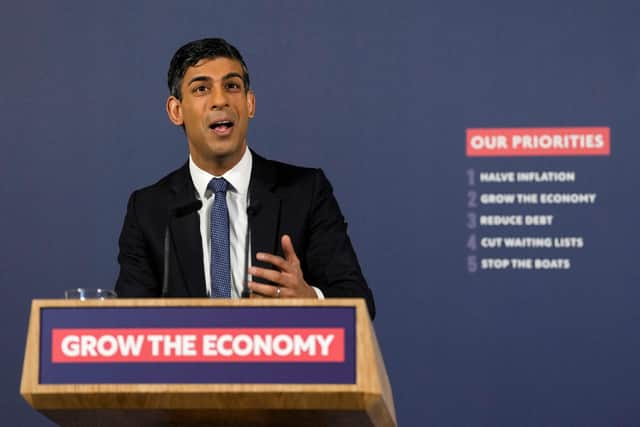Anti maths mindset: meaning, what did Rishi Sunak say about plans to have pupils study maths until they’re 18?
and live on Freeview channel 276
Rishi Sunak has said that the UK must shed its "anti-maths mindset" in order to grow the economy.
The Prime Minister made the comments while announcing a review led by experts into how to carry out his plan to ensure that all students in England study maths in some capacity until they are 18 years old, without making maths A-Level compulsory.
Advertisement
Hide AdAdvertisement
Hide AdSunak’s speech in north London criticised the "cultural sense that it’s OK to be bad at maths", which he said is "putting children at a disadvantage" by failing to provide them with the analytical skills necessary for the modern workplace.
But critics have accused Sunak with rehashing his maths-to-18 pledge, which he first made in January, in order to draw attention away from the ongoing pay dispute which will result in another teacher walkout later this month.
Teachers and education experts have expressed concern that the policy fails to address significant issues with the wider educational system, such an already severe shortage of maths teachers. Here is everything you need to know about it.
What does ‘anti-maths mindset’ mean?


Sunak told an audience of students, teachers, education experts, and business leaders: “We’ve got to change this anti-maths mindset. We’ve got to start prizing numeracy for what it is – a key skill every bit as essential as reading.
Advertisement
Hide AdAdvertisement
Hide Ad“I won’t sit back and allow this cultural sense that it’s OK to be bad at maths to put our children at a disadvantage. My campaign to transform our national approach to maths is not some nice-to-have. It’s about changing how we value maths in this country”.
The UK is one of the only nations in the world that does not require young people to study maths in some capacity until the age of 18, making it one of the least numerate among the 38 OECD advanced economies.
According to Downing Street, around a third of students fail to pass the GCSE maths exam, and more than eight million adults have numeracy skills that are below what is expected of a nine-year-old.
What is Sunak’s plan?
The Prime Minister announced a review led by experts of his plan to guarantee that all students in England study maths in some capacity until they are 18, without making maths A-Level compulsory. The review will consider whether a new maths qualification is required, as well as what core maths material students will need to study.
Advertisement
Hide AdAdvertisement
Hide AdLearning activities to “excite young people about the relevance of maths” could include “building sets for school plays to calculating the angles of free kicks or the speed of a Formula 1 car,” Sunak said.


Sunak first announced his maths-to-18 commitment in January, highlighting the significance of numeracy in careers that are more and more dependent on data and statistics. He said it may not be achieved in this Parliament.
Former chancellor Sunak argued that maths attainment will help young people in their careers and grow the economy. “We simply cannot allow poor numeracy to cost our economy tens of billions a year or to leave people twice as likely to be unemployed as those with competent numeracy,” he said.
“We have to fundamentally change our education system so it gives our young people the knowledge and skills they need – and that our businesses need – to compete with the best in the world.”
Advertisement
Hide AdAdvertisement
Hide AdHe also announced plans for a new voluntary and fully funded professional qualification for primary school maths teachers, along with plans to expand maths hubs, where schools and colleges collaborate to support the teaching of the subject.
Is an ‘anti-maths mindset’ really the problem?
Loading....
Sunak has come under fire for repeating his maths-to-18 pledge, which critics say is an effort to divert attention from the ongoing pay dispute which will lead to another teacher walkout later this month.
Concern has also been raised by educators and teachers over the policy’s failure to address important problems with the larger educational system, such as the already severe shortage of maths teachers.
Geoff Barton, general secretary of the Association of School and College Leaders, said that instead of “re-announcing a vague and poorly thought-out policy”, Mr Sunak should focus on resolving the pay dispute which has triggered industrial action.
Advertisement
Hide AdAdvertisement
Hide Ad“It is hard to understand why the Prime Minister is rehashing his ambition of maths to 18 having only announced this policy in January and with no further detail of what it will entail or how it will be delivered.
“It seems like an attempt to divert attention away from the most pressing matter in education in England which is the industrial dispute triggered by the erosion of teacher pay and conditions and resulting crisis in recruiting and retaining enough staff.
“These severe shortages directly undermine the Prime Minister’s ambition because it means there are not enough maths teachers to deliver even the existing requirements let alone extend maths to every pupil to the age of 18.”
Labour criticised the “empty pledge”, with shadow education secretary Bridget Phillipson saying: “Once again, the Prime Minister needs to show his working: he cannot deliver this reheated, empty pledge without more maths teachers.
Advertisement
Hide AdAdvertisement
Hide Ad“But after 13 years of failing our children, the Tory government repeatedly misses their target for new maths teachers, with maths attainment gaps widening and existing teachers leaving in their droves.”
Gillian Keegan, the education secretary, declined to say how many more maths teachers she believes will be required to carry out the new government policy.
Asked on BBC Radio 4’s Today programme how many more teachers she believed it would be necessary to recruit to facilitate the “maths-to-18” plan, she said: “It depends on what the expert panel say they’re actually going to be learning.”
Comment Guidelines
National World encourages reader discussion on our stories. User feedback, insights and back-and-forth exchanges add a rich layer of context to reporting. Please review our Community Guidelines before commenting.
